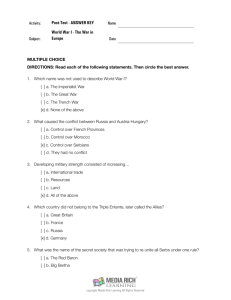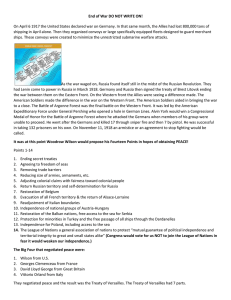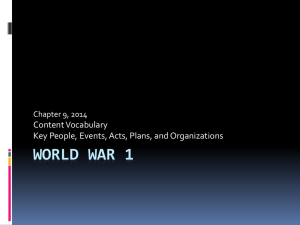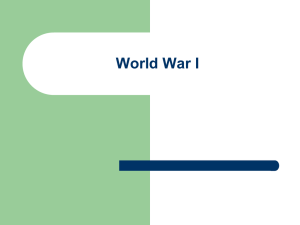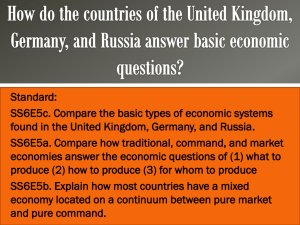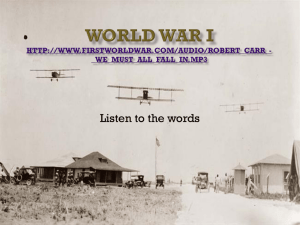Document 15517581
advertisement
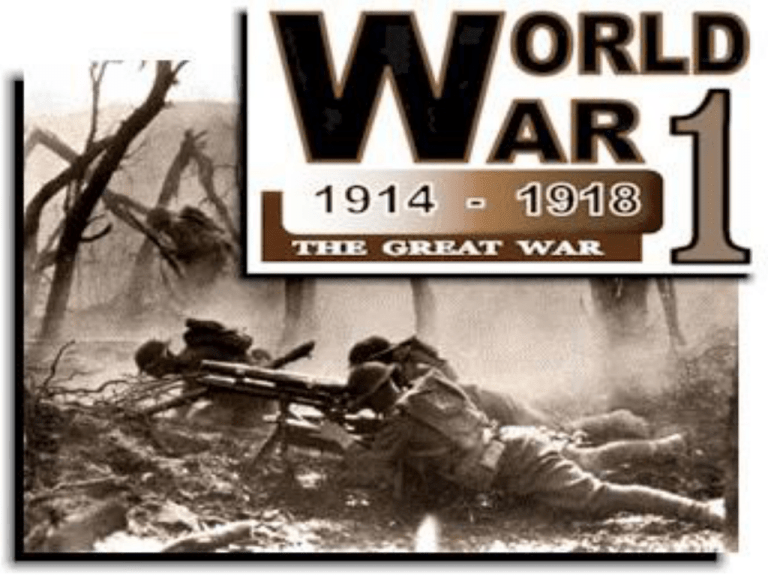
The Powderkeg explodes Sarejevo, June 28, 1914Assassination of Archduke Francis Ferdinand (Heir to Austrian Throne) •Killed by Gavrilo Princip •Member of Serbian Nationalist group “The Black Hand” Opposed Austrian rule Background Causes •Militarism •Alliances • Imperialism •Nationalism Keeping armed forces prepared for war. Belligerent (War-like attitude) Arms race among European powers Ex. Fiercest rivalry between Germany & Britain Military or economic friendship between countries (Ex.Treaties) Pre-War –Triple Alliance –Triple Entente During War –Central Powers –Allied Powers Triple Alliance Triple Entente Germany Austria-Hungary Britain France Italy Russia competition among Europeans for colonies in Africa & Asia Pride in one’s country or desire for independence Balkans – Ethnic Strife – Powder Keg Germany – Proud of growing military & industrial strength The ethnic distribution of Austria-Hungary German 24% Hungarian 20% Czech 13% Polish 10% Ruthenian 8% Romanian 6% Croat 5% Slovak 4% Serb 4% Slovene 3% Italian 3% France •Wanted Revenge for losing Alsace & Lorraine Russia •Pan-Slavism- wanted to unite all Slavic Peoples (Ex. Balkans) Austria – •Against all Slavic nationalism Alliance System Kicks in Germany offers Aust. Carte Blanche Austrians issue Serbia ultimatum Austria - Hungary Declares War on Serbia Russia Mobilizes its forces Germany declares war on Russia Germany declares War on France Germany invades Neutral Belgium to gain access to France In response Britain declares war on Germany “The Lamps are going out all over Europe. We Shall not see them lit again in our lifetime” Sir Edward Grey Central Powers Germany Austria-Hungary Ottoman Empire Bulgaria China Allied Powers Britain France U.S. (1917) Italy *** Japan German military plan @ outset of war •Rapidly defeat France & than attack Russia •German army stalls outside Paris (Marne) Plan failed Forced to fight a two front war •Marne River- Germans stopped @ outskirts of Paris ending Schlieffen Plan •Verdun – German offensive failed •Somme RiverAllied Offensive failed Millions of soldiers killed for no gain Located on the French and German border • French and British Vs. German and Italian forces • Schleifan Plan Fails • Trench Warfare • Stalemate- Battle lines remained unchanged opposing armies fight each other from dug in trenches • No Mans Land in middle • Horrible conditions Trench foot Shellshock Advances in weaponry =More death & destruction than ever before (8.5 mill. Killed) Submarine Warfare War in the Air French tank Tanks Original British tank U. S. German tank Heavy Artillery Poison Gas Machine Guns Flamethrowers Grenade launcher Fought on 3 continents Over 30 countries involved Two oceans Located along the German and Russian border • Russian and Serbians Vs. Germans, Austrians, and Turks • More mobile than western Front •British help Arab nationalists rise up against Turks •Lawrence of Arabia leads guerilla raids •Allies gain control of Baghdad,Jerusalem, Damascus •Allied plan to attack Ottoman Empire •Hoped to take control of Dardanelles •Wanted to establish supply lines to Russia Plan failed •Balfour Declaration •British support a Jewish national homeland in Palestine Troubles still exist today •Japanese gain control of German possessions in China & the Pacific •England & France seize German possessions in Africa •British & French colonies support allied war efforts •Britain imposes Naval Blockade of Germany •German U- Boats attacked Allied ships Both nations experienced severe food shortages Countries devoted all resources to the war effort •Command Economy Govt. decides what to produce & how much Govt. converted facilities into factories Unemployment non-existent •Taxes were raised & monies borrowed to finance the war •War Bonds •Government drafted men to fight •Woman more involved in the workforce •Contributions helped them in gaining right to vote after the war •Rationing •Limited the amount of goods people could buy •Ex. Butter, leather, etc. were needed for the war effort •Victory Gardens •Censorship •Govt. controlled info about the war •Propaganda •The spreading of ideas to promote a cause or to damage an opposing cause I. 1917 U.S. Enters War II.1918 Russia withdraws from War Proclaimed neutrality @ outset of hostilities •Public opinion divided over loyalties (Central vs. allies?) •U.S. traded & lent money to both sides •Wilson reelected under slogan”He Kept us out of the war” •German policy of unrestricted Submarine Warfare •Ex. LusitaniaAmerican lives lost •Zimmerman telegram •U.S. public outraged •Wilson declares war •Not industrialized (lack of supplies) •Only strength is #’s •Lack of leadership/morale •Civil unrest @ home Shortages, death toll, riots Russian Revolution of 1917 •Lenin promises “Peace, Bread, & Land” •Signs Treaty of BrestLitovsk (1918) Separate peace with Central Powers Russia leaves war Harsh(Russia loses enormous amounts of land) •U.S. Troops help allies defeat exhauster German army @ the nd 2 Battle of the Marne •Allies push towards Germany •Kaiser Wilhelm forced to abdicate •New German government (Weimer Republic) signs armistice •Nov. 11,1918 @ 11 am the armistice is signed Veterans day is Nov. 11 8.5 million killed/17 million wounded Mass destruction/famine Huge War debts/reparations New technology introduced U.S. becomes creditor nation End of major empires-A/Hungary, Germany, Russia, OttomanTurks Treaty of Versailles WWII •Held @ The Palace of Versailles, France •Decisions made by major Allied powers •Germany & its allies not represented but had to abide by decisions •Russia not represented In the midst of Civil War •Representatives of the 4 major allied powers U.S.- Woodrow Wilson Great Britain- David Lloyd George France- Georges Clemenceau Italy- Vittorio Orlando ** Each came w/ their own agenda British & French Representatives wanted to punish Germany •Strip Germany of War making powers •Pay for suffering caused by war Wilson wanted “Peace without Victory” based on his 14 points Plan for achieving a just & lasting peace •End to secret treaties •Freedom of Seas •Free trade •Reduced militaries •Self determination for new nations A League of th Nations (14 Point) •Organization of Nations that would solve world conflicts through diplomacy •Similar to the United Nations today League of Nations formed Germany & Russia originally excluded Territorial losses for Germany •Alsace Lorraine •French border extended to Rhine •All overseas colonies Military Restrictions Limited size of German Army Prohibited manufacturing or purchase of War Materials Forbid submarines & air Force Rhineland becomes demilitarized zone War Guilt Clause Harshest provision Sole responsibility for war placed on Germany Germany forced to pay allies $33 billion in reparations Germans were horrified by treaty •Austro Hungarian Empire carved into •Austria, Hungary, Czechoslovakia, & Yugoslavia •Ottoman lands became Mandates •Territories administered by a Western Power •Palestine, Iraq, Transjordan,etc. U.S. rejected Treaty & League of Nations Mandates in Africa & Asia upset about not gaining independence Italy & Japan hoped to gain more territory Treaty left bitterness & hatred in hearts of Germans Would set the stage for WWII 8.5 million killed/17 million wounded Mass destruction/famine Huge War debts/reparations New technology introduced U.S. becomes creditor nation End of major empires-A/Hungary, Germany, Russia, OttomanTurks Treaty of Versailles WWII

